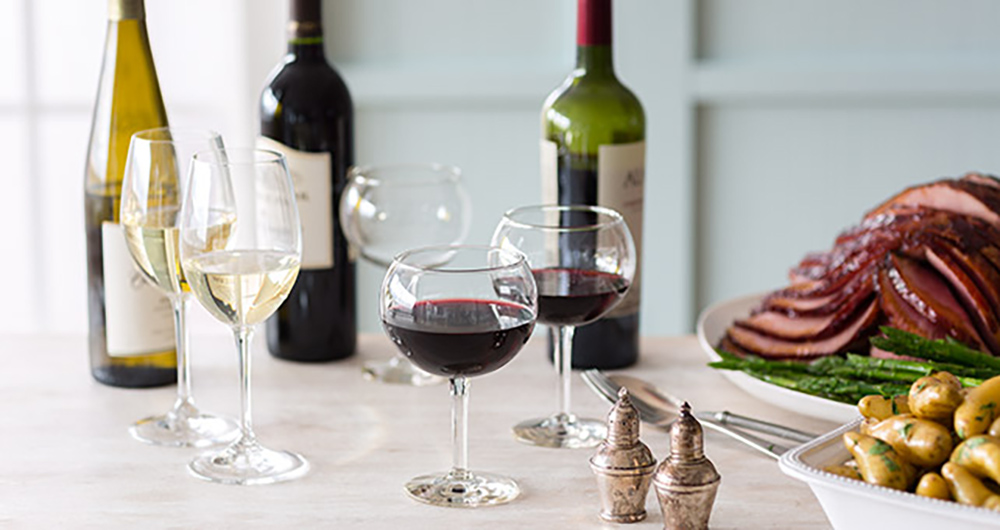By David Setley
Spring has sprung! The grass is getting greener, the daffodils are blooming, and we are pushing past winter with thoughts of warmth and renewal. Two upcoming holidays find importance on many calendars: Easter and Passover. I myself was raised in the Christian tradition and am quite familiar with the traditional festivities and foods that go along with Easter. Since working in the wine industry, however, I have been privileged to learn about other religions and their associated celebrations as I am asked to recommend wine pairings. In December, two of my colleagues and I offered a multi-cultural food and wine pairing event celebrating the winter holidays of Christmas, Kwanzaa, and Hanukkah. In preparation for this article, I have been researching foods often served with Easter and Passover in order to suggest wines that will complement your table nicely.
The typical Easter feast tends to be centered around one of three meats: ham, turkey, or lamb. For those of you serving ham, I would suggest a dry Riesling, such as the Pierre Sparr Riesling from Alsace, France. It has the relatively high acidity that Rieslings are known for, but is dryer with more minerality than you may expect. If turkey is your selection, think Beaujolais Gamay or Pinot Noir. These varietals are medium-bodied red wines with the perfect blend of fruit, earthiness, and a light acidity that pairs wonderfully with turkey. My choice is the L. Tramier & Fils Coteaux Bourguignons, a blend of the two classic Burgundy reds. If lamb is on your menu, I suggest a more savory wine, such as the Cotes du Rhone Grenache, Syrah, Mourvèdre (GSM) blend like the Domaine Brusset Cotes du Rhone Laurent B. Lamb is a bit gamier than many other meats, and this wine holds up to it perfectly.
Being half-Italian, our Easter table was not always adorned with ham, turkey, or lamb, but rather the Italian Easter Pizza, or Pizza Rustica. For those of you unfamiliar with this delicious entrée, it is not the flatbread-style pizza that we all know and love. Instead, it is a double-crusted pie filled with ricotta, mozzarella, parmigiana or Pecorino Romano cheese, and a cured meat. The recipe that I have passed down to my daughters was passed to my generation from my mother, who learned it from her mother, and back through the generations to Naples, Italy, where my Italian family originated. Our recipe adds a bit of cooked rice and mild soppressata to the filling and, rather than creating it as a typical double-crusted pie, my family rolls the crust out, adds the filling and folds the crust over into a half-moon shape. The result is heaven on a plate. For wine pairings, if you prefer white wine, Pehhcora Pecorino is a perfect compliment. It is dryer, with more minerality and a less fruit-forward flavor than Pinot Grigio, but still light and very refreshing. For red wine lovers, The Rocca del Dragone Aglianico is a perfect pairing. This deep ruby-red wine is full-bodied but very smooth and elegant. Either would be perfect with an Italian Easter Pizza. By the way, I’m happy to share my family recipe if you email me or stop by the store!
My personal culinary experience with Jewish celebrations has been limited to making Challah Bread around Hanukah. For this article, I conducted some research into the Seder Dinner served at Passover. According to Chabad.org, the Seder Plate is the base of the dinner and consists of 3 Matzahs (unleavened bread), bitter herbs, Zeroa (a piece of roasted meat, often chicken), Bietzah (a hard-boiled egg), Charoset (a fruity paste), and Karpas (a vegetable, such as carrot or potato). The Seder Plate may be accompanied by a traditional chicken egg noodle soup, potato kugel, or a braised or roasted brisket. I was intrigued to learn of the tradition of serving four glasses of wine with the dinner. According to the Washingtonpost.com, each adult drinks from four cups of wine during the meal. Each cup represents stages in the Israelites redemption from the slavery of the Egyptians. A fifth cup is reserved for the hopeful return of the prophet Elijah. There are numerous very good Kosher wines, made by Barkan, that may be appropriate for the Seder. Barkan produces Cabernet, Sauvignon, Pinot Noir, Chardonnay, and Sauvignon Blanc. Another Kosher wine is the Moscato d’Asti by Bartenura. This is a perfect complement for most desserts, or could serve as a wonderful welcome wine at the start of the meal. Look for the Kosher for Passover label.
I hope this article enhances your Spring holiday celebrations. Contact me with any questions or comments at dsetley@passionvines.com or stop into the Somers Point store. Until next time, Happy Spring and Happy Wining!
David Setley is enjoying his retirement from higher education as a wine educator and certified sommelier at Passion Vines in Somers Point, New Jersey.






